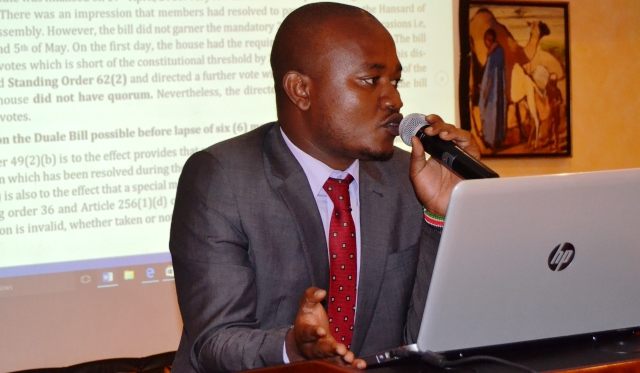Unlocking The Stalemate On The Framework For The Realization Of The Not More Than Two Thirds Gender Principle
Article 27(8) of the Constitution in the Bill of Rights obligates the State to take legislative and other measures to implement the principle that not more than two-thirds of the members of elective and appointive bodies shall be of the same gender popularly referred as to the two-thirds gender principle. Further, Article 81(b) provides for the “not more than two thirds of members of elective public bodies shall be of the same gender” as a principle of the Kenya’s electoral system which shall be complied with.
In article 177(1)(b), there exists a mechanism for realization of the not more than two thirds gender principle in county assemblies while the same is lacking in Article 97 and 98 which provides for the composition of the National Assembly and the Senate respectively. Consequently, the 2013 general elections resulted in a parliament short of at least one third representation of women as required in Article 27(8).
In order to avert fatal consequences of noncompliance with the principle after the 2013 elections, the Supreme Court issued an advisory allowing parliament to enact a mechanism to enforce article 81(b) before 27th August, 2015. The National Assembly extended this deadline by one more year to 27th August, 2016. At the beginning of the 2014, the government formed a multi sectoral technical working group (TWG) to guide and develop the framework and after more than one year of extensive consultations the TWG delivered the most technically sound and practicable formula.
The formula ensures that at any one time the August House would be constitutionally constituted, is gender neutral and would apply in the event the tide changed to the disadvantage of men. The formula is simple, direct and adheres to the principles on elections as outlined in Article 82 of the Constitution. It provides room to encourage direct election of women and other marginalized groups so as to limit the extent of its application through proposed additional amendments to existing legislation. It also protects and guarantees gains already made in the Constitution by reserving elective positions of 47 county women MPs in the National Assembly and all nomination seats in both houses.
The formula was packaged to a Constitutional (Amendment) (No. 4) Bill, 2015. This bill sponsored by the leader of Majority in the National Assembly Hon Duale was published on 24th July 2015. Despite high levels of public confidence and anticipation in this bill, the motion was defeated in the floor on two occasions by failure to meet the minimum required votes to pass a constitutional amendment bill.
An observation of the voting pattern on this bill shows that the motion was appealing and lively in the house but there lacked adequate numbers of legislators in attendance to give the bill the required minimum votes. Of the members present on the initial day of the voting, a majority (81 percent) voted yes.
The Duale bill however was not the only framework presented to Kenyans to consider. Other popular initiatives include the green amendment movement, ‘thuluthi mbili za mama twazitaka sasa’, a bill sponsored by Senator Sijeny among other initiatives all seeking to implement the principle within the constitutional deadline. With less than ten days to go, there still lacks an implementable framework but there is hope with a constitutional amendment bill no 16 currently before the Senate which if fast tracked could be passed within the deadline at the Senate pending concurrence from the National Assembly.
Unlocking the stalemate
The Constitution of Kenya (Amendment) Bill, 2015 (Senate Bill No. 16 of 2015)
This Bill by Sen. Judith Sijeny was published on 21st August, 2015 and first read on 15th September, 2015 in the Senate. It contains the same formula as in the Duale Bill.
This bill offers the best last hope for unlocking the stalemate on a framework for the realization of the not more than two thirds gender principle.
Call to action
Both Houses have an opportunity to provide leadership and fasttrack the passage of the Constitution of Kenya (Amendment) Bill, 2015 (Senate Bill No. 16 of 2015) which is coming up for a vote this Thursday, 18th August, 2016. It is important to note that failure to have this framework in place will plunge the country into an unprecedented constitutional crisis in the event that the 2017 Parliamentary elections do not produce the minimum required one third members of either gender to comply with the principle.
The writer is a Legal Officer at the National Gender and Equality Commission. smbithi@ngeckenya.org


Comments